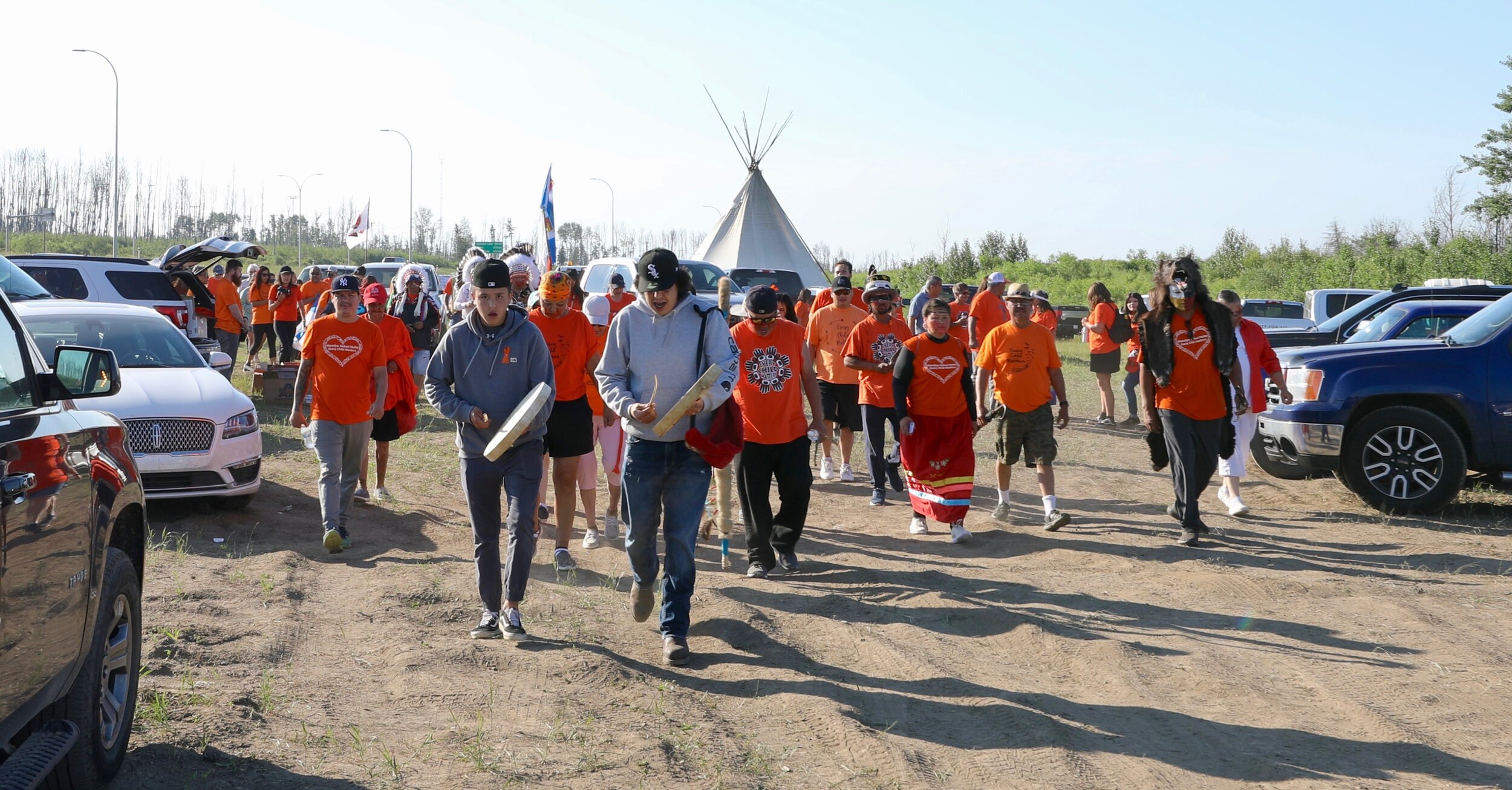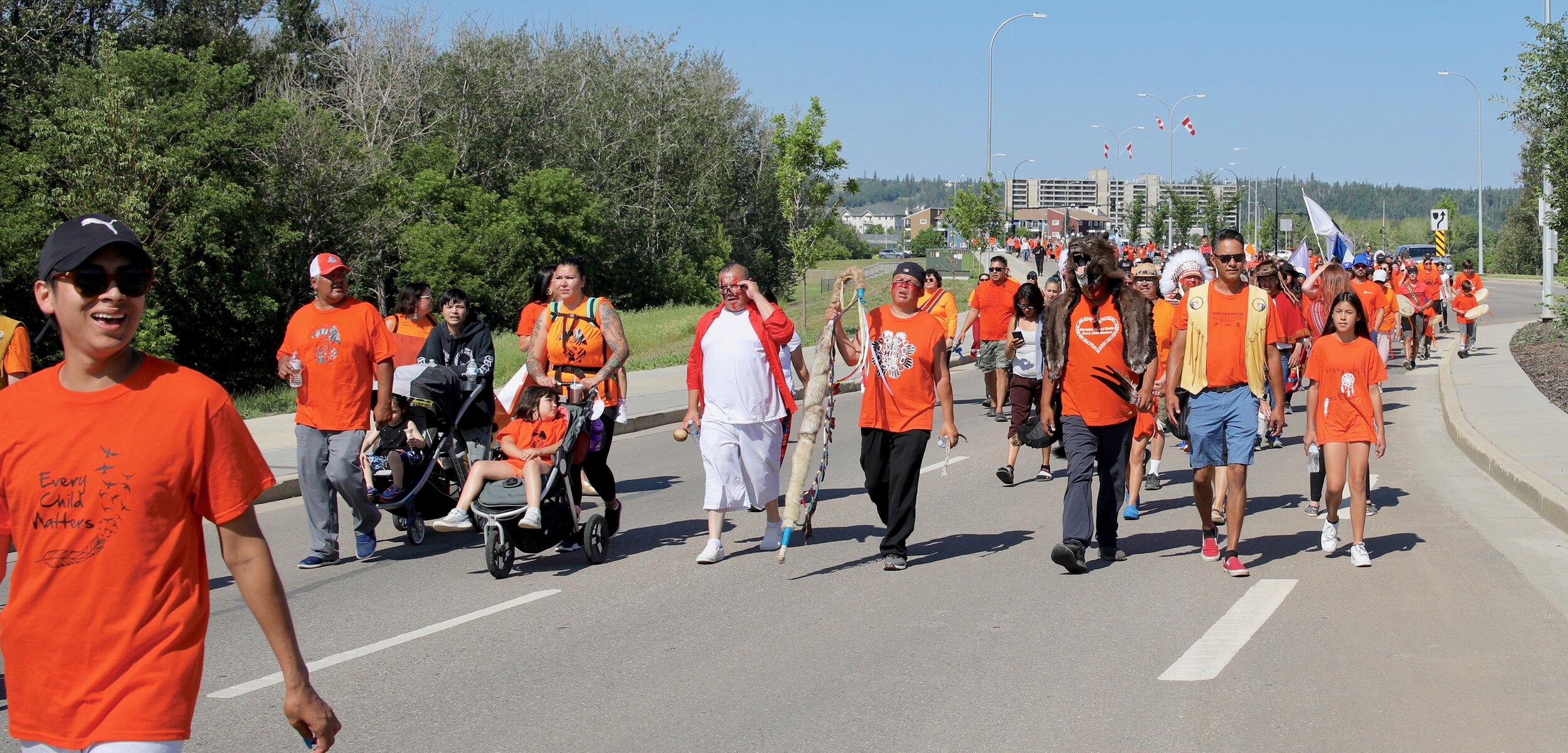MEMORIAL WALK AND GATHERING IN SOLIDARITY SUPPORTED BY OVER 1000 PEOPLE AS THE FIRST NATIONS OF THE ATHABASCA TRIBAL COUNCIL DEMAND ACTION AGAINST OPPRESSION
FOR IMMEDIATE RELEASE
(July 8, 2021, Fort McMurray, AB) – The five First Nation Chiefs representing the Athabasca Tribal Council (ATC), the Treaty 8 Grand Chief, and Métis leaders, walked into Fort McMurray in the Memorial Walk in Solidarity with the support of approximately 350 Indigenous community members and non-Indigenous supporters. The walk concluded at Snye Point Park. Well over 1000 people attended the Memorial Gathering in Solidarity throughout the day to listen and learn from Residential School survivors. Indigenous leaders demanded action from governments, churches and the public to create a better future for Indigenous people in Canada.
Indigenous leaders in attendance included the following:
Chief Allan Adam, Athabasca Chipewyan First Nation and President, Athabasca Tribal Council
Chief Vern Janvier, Chipewyan Prairie First Nation
Chief Mel Grandjamb, Fort Mckay First Nation
Chief Ron Kreutzer, Fort McMurray 468 First Nation
Chief Peter Powder, Mikisew Cree First Nation
Arthur Noskey, Treaty 8 Grand Chief
Kendrick Cardinal, President Fort Chipewyan Metis Association
The Memorial Walk in Solidarity started at the Janvier Health Center on July 1 – Canada Day. Chief Vern Janvier and members of Chipewyan Prairie First Nation gathered to walk in memory of the Residential School survivors and the children who never made it home. Throughout the 130-kilometre route to the Snye River in Fort McMurray, the walk gained momentum, with supporters joining various legs of the journey. Dozens of community members provided support with food and water. The Athabasca Tribal Council supported the needs of the community members and took action to provide additional support, including teepees set up along the route providing a gathering place for the walkers to start and end their seven-day journey.
As the Memorial Walk in Solidarity gained momentum, the Athabasca Tribal Council called on the community and the public-at-large to join the walk and show support for the First Nations and Métis communities. They have suffered and continue to be affected by these atrocities. Many non-Indigenous supporters showed up throughout the walk to give our communities the strength they needed to continue and have hope for change in the near future.
The total effect of this support was felt at Snye Point park as the Memorial Walk in Solidary ended, and an estimated 1000 people from Wood Buffalo and beyond came to support our First Nations and Métis people as our Nations honoured the survivors and those lives lost at Residential Schools. The Athabasca Tribal Council set up three teepees, trappers tents and other event tents to host attendees and support the Indigenous community as they shared cultural knowledge, practices, and teachings to attendees who wanted to learn.
“I’m very proud of the ATC staff and our First Nation and Métis communities who all worked together to make this a true community event,” said Karla Buffalo, CEO of Athabasca Tribal Council. “This is a time when our community members are reliving the trauma of residential schools and we wanted those members to know that we hear them and believe them when they tell us of the abuse and trauma they experienced at residential schools.”
“When we look at the 94 Calls to Action, we see the systemic oppression that is actively held against our people,” said Chief Adam, President of the Athabasca Tribal Council. “In six years, only a handful of the 94 calls to action have been completed. The Indian Act still holds power over how our people are treated and how we live. There is no reconciliation without action. We intend to call upon the federal government to change the Indian Act. It must change for the benefit of all First Nations.”
High-resolution photos of the Memorial Walk in Solidarity and the Memorial Gathering in Solidarity are available to media below.
ATC Community Members who are in need of emotional support are encouraged to call the Athabasca Tribal Council’s IRS Support Worker, Lyn Chartrand, at 780-799-2461, Monday to Friday 8:30 a.m. – 4:30 p.m. The National Indian Residential School Crisis Line at 1-866-925-4419 is available 24 hours a day, seven days a week to all Indigenous people.
-30-
About ATC
Athabasca Tribal Council is an organization that serves our First Nations by providing relevant and innovative programs and services that enrich the well-being, health and prosperity of its people. ATC is committed to ensuring the protection of inherent rights, Treaty Rights, and their Traditional Territories while respecting the autonomy of each Nation. For information, visit atcfn.ca.
ATC Office Contact Information:
Phone: (780) 791-6538
Email: info@atcfn.ca
For more information:
Chief Allan Adam
President, Athabasca Tribal Council
Chief, Athabasca Chipewyan First Nation
780-713-1220
From left to right:
Kendrick Cardinal, President Fort Chipewyan Metis Association
Chief Peter Powder, Mikisew Cree First Nation
Arthur Noskey, Treaty 8 Grand Chief
Chief Mel Grandjamb, Fort Mckay First Nation
Chief Ron Kreutzer, Fort McMurray 468 First Nation
Chief Vern Janvier, Chipewyan Prairie First Nation
Chief Allan Adam, Athabasca Chipewyan First Nation and President, Athabasca Tribal Council





